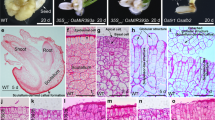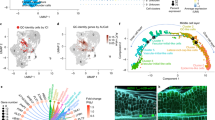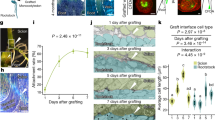Abstract
INDEPENDENT regeneration of root or shoot primordia is common in higher plants. However, the simultaneous, integrated development of both primordia from a single small mass of meristematic cells is found almost exclusively in ovular embryos. We have observed the development of structures bearing both these primordia, from callus tissue cultures of the wild carrot, Daucus carota L. These structures closely resemble in situ pro-embryos and embryos both morphologically and in their pattern of development.
This is a preview of subscription content, access via your institution
Access options
Subscribe to this journal
Receive 51 print issues and online access
$199.00 per year
only $3.90 per issue
Buy this article
- Purchase on Springer Link
- Instant access to full article PDF
Prices may be subject to local taxes which are calculated during checkout
Similar content being viewed by others
References
Steward, F. C., Mapes, M. O., and Mears, K., Amer. J. Bot., 45, 705 (1958).
Caplin, S. M., and Steward, F. C., Science, 108, 655 (1948).
Steward, F. C., Caplin, 8. M., and Millar, F. K., Ann. Bot. 16, 58 (1955).
Steward, F. C., Amer. J. Bot., 45, 709 (1958).
Author information
Authors and Affiliations
Rights and permissions
About this article
Cite this article
WETHERELL, D., HALPERIN, W. Embryos derived from Callus Tissue Cultures of the Wild Carrot. Nature 200, 1336–1337 (1963). https://doi.org/10.1038/2001336a0
Issue Date:
DOI: https://doi.org/10.1038/2001336a0
This article is cited by
-
Somatic embryogenesis in Cucurbitaceae
Plant Cell, Tissue and Organ Culture (1993)
-
Carbaryl effects on growth and development in suspension cultures of wild carrot
Bulletin of Environmental Contamination and Toxicology (1976)
-
DNA synthesis during development of adventive embryos of wild carrot
Biologia Plantarum (1973)
-
Restoration of declining morphogenetic capacity in long term tissue cultures ofDaucus carota by kinetin
Experientia (1972)
-
Clonal Multiplication ofNicotiana rustica L. from Shoot Meristems in Culture
Nature (1968)
Comments
By submitting a comment you agree to abide by our Terms and Community Guidelines. If you find something abusive or that does not comply with our terms or guidelines please flag it as inappropriate.



